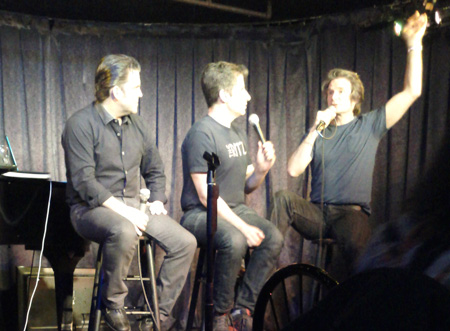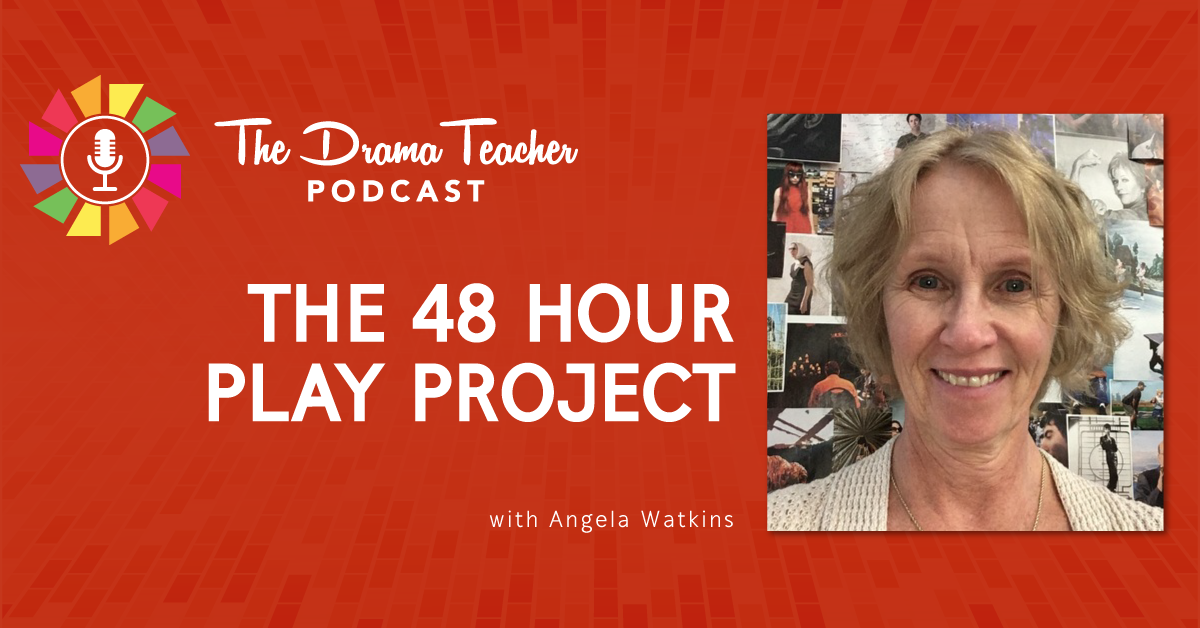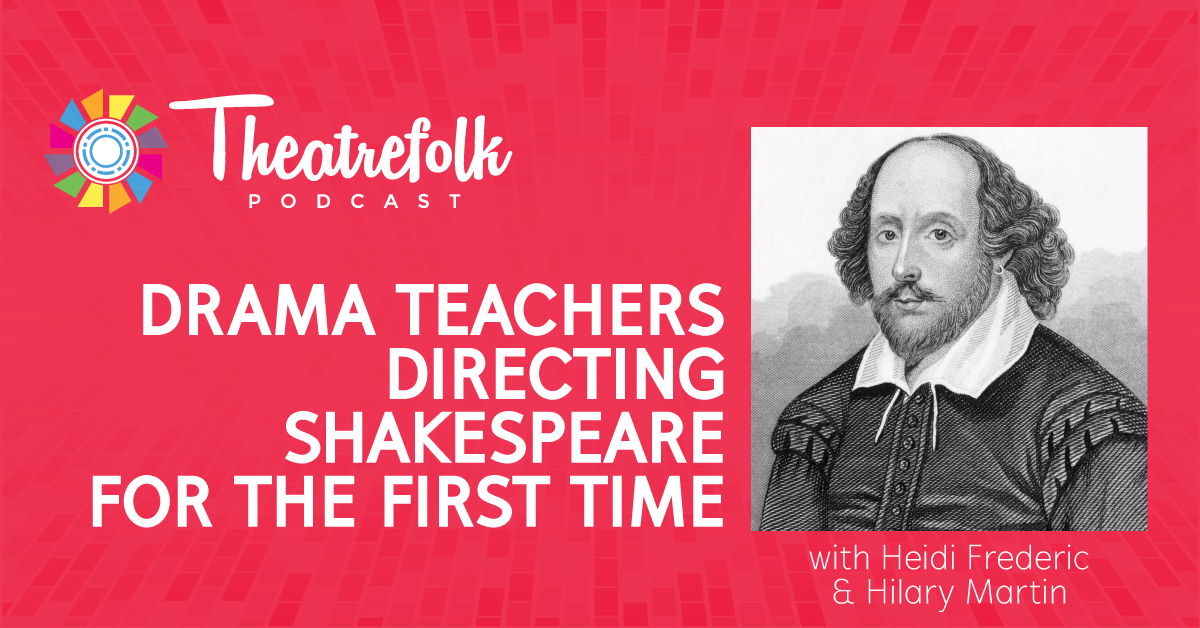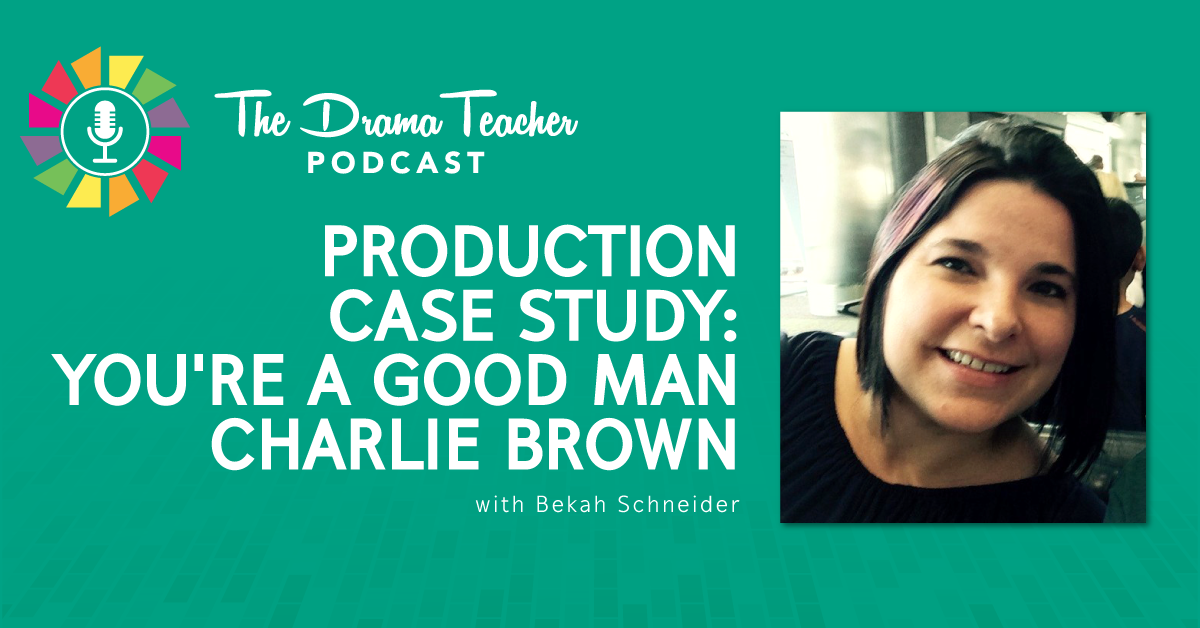New York Part Two
Episode 30: New York Part Two
In part two of Craig and Lindsay’s New York adventure they talk about their favourite theatrical experience – Too Much Light Makes the Baby go Blind.
Show Notes
Subscribe to The Theatrefolk Podcast
Episode Transcript
Welcome to TFP, The Theatrefolk Podcast. I am Lindsay Price, resident playwright for Theatrefolk. Hello! I hope you’re well. Thanks for listening.
Today, we have part two as Craig and I dish on our favourite New York experience. But first, let’s do some THEATREFOLK News.
Lots a great stuff going on over on our blog over on theatrefolk.com/blog. We’ve already talked about Movie Monologue Monday and we also have an on-going series of playwriting exercises on Saturday. It has been so much fun to work on this series. I think that it just really sits in an interesting part of my brain. I love coming up with exercises. I love trying to find new ways to help encourage, inspire writers. This week, it’s going to be a “picture prompt as writing inspiration” post.
Every time we’re in New York the visual stimulation is just mind-blowing. There is always something awesome to look at, interesting, exciting. Everywhere you look there is a story. Now, often it is a story that I am completely fabricating, I’m making up as we go, but, you know, that’s what writers do, right? Make it all up! I have to put my crazy mind to work. I have to make it do something useful, you know?
So, last time in NYC, I was really taken by textures – murals, mosaics, ceilings, floors. So, that’s going to be the application of this week’s picture prompt. Write a scene that takes place in or incorporates aspects of the photograph.
Lastly, where, oh, where can you find this podcast? We post new episodes every Wednesday at theatrefolk.com and on our Facebook page and Twitter. You can find us on the Stitcher app AND you can subscribe to TFP on iTunes. Imagine that! All you have to do is search on the word “Theatrefolk.”
Episode Thirty: New York Part Two
Thirty? We’re already up to thirty episodes? Isn’t that wonderful? That’s amazing. All right, let’s keep going.
So, today we’re back in New York City where Craig and I talk about our favourite theatrical experience in New York and actually anywhere. We also talk about a live interview we saw with Seth Rudetsky. He has a show called Seth’s Chatterbox in the back of a tiny basement cabaret bar where he interviews Broadway performers and these two that he interviewed the time that we went share some very interesting points on the path to Broadway, on succeeding on Broadway and failing on Broadway. So, keep listening to find that out.
Lindsay: Hello, Craig. How are you?
Craig: Me?
Lindsay: Yes.
Craig: I’m good. I’m tired.
Lindsay: Yes! We’re nearing the end of our time here in New York, right? And I think that last night we did what is, I think, it’s my top theatrical experience. How does it rate for you?
Craig: Last night’s show?
Lindsay: Just going to see this show in general?
Craig: Oh, I think it’s something that I, sometimes, it’s only on two nights a week and, sometimes, we come here and it’s not on the nights we’re here and I feel lesser for not having seen it.
Lindsay: The show that we’re talking about, it’s a very unique experience. It only plays in New York and Chicago and it’s been running for years and years and years and years. We figured out that we started going in 2004.
Craig: Which is impossible because we’re not that old.
Lindsay: That means we’re old!
Craig: Weren’t we in high school in 2004?
Lindsay: Yes, of course, we were. And this is a show called Too Much Light Makes The Baby Go Blind put on by the New York Neo-Futurists and it’s a very simple concept. It is 30 plays in 60 minutes.
Craig: They attempt to perform the 30 plays in 60 minutes. You’re given a menu when you go into the theatre, listing just the play’s title. And along the stage, there’s a clothesline and 30 numbers. And when one play ends, it’s encumbered on you – the audience member – to scream as loudly as you can for the number of the play that you want to see next.
Lindsay: And there’s a wide variety of types of plays. They all start with the announcement of the play title and go. And they all end with curtain – that’s how you know when they begin and they end. And some of them are monologues, some of them are political in nature, some of them are absurd in nature, and some of them have no words at all. Some of them are just jumbled words. It’s action. It’s dance. It’s pure strict play. It all depends on…
Craig: Some is audience interaction.
Lindsay: Ah, yes, some are audience interaction. It all depends on the performers who are the writers and the creators and the performers of the pieces. The other thing which is really important is that, when the people perform their plays, they’re not putting on characters. They’re always themselves and it comes from themselves. And so, what you get is you get an experience that, as I said we’ve been going since 2004, and it is never the same twice, and it’s purposely never the same twice because what they do on each night that they perform is they roll a die and the culmination of the two nights is that’s how many plays get ripped from the menu from one week and have to change and become world premieres.
Craig: Yeah, that was pretty neat. I’m not sure we’ve ever seen it on a Friday before. I never remember them yelling out that it was a world premiere before. But we saw several world premieres last night.
Lindsay: We saw seven.
Craig: Seven.
Lindsay: And I just think, you know, we both left the show and it was midnight and we walked 50 blocks back to our hotel and we were, like, on Cloud Nine and we were just inspired and it was a very creative experience.
Craig: Yeah, I love these guys.
Lindsay: Yeah, it just made me feel wonderful and theatrical and we both went, “My god, if we were twenty.”
Craig: Have you seen any of those cast members before?
Lindsay: No, I think they were all new to us.
Craig: I think maybe we saw the woman from Chicago when we were in Chicago.
Lindsay: Oh! You think so?
Craig: I think, maybe.
Lindsay: And they have a wide variety of ages and point of views and I just think that it’s the one thing if you come to New York I think you should see if you’re an actor or a writer. I think, if I was twenty, it would be my ideal job because I’m not a traditional performer but there’s an aspect of that kind of performance that I would enjoy, I think. And also, just getting your point of view out in as many different ways as possible.
Like, there was a play called Writer’s Block in which a writer was essentially blocked by the other actors and they got in his way and they dragged him across the stage by the shoelaces.
Craig: They tied up his arms.
Lindsay: They tied his arms and then they duct-taped a pen to his chest and the point of the play was he had to fight to get the pen open, get it maneuvered in his body in such a way, and write on the page which he did.
Craig: Yeah, yeah, that was really cool.
I think my favourite piece last night was, what was the first piece that we saw? I remember thinking that was really good. But then, towards the end, I think my favourite piece was the piece on the subway…
Lindsay: Yes.
Craig: …Where there was a woman chewing the gum loudly and it became this kind of fantastical monologue where she was taking a whole other journey through her life and then brought it back to the woman next to her chewing the gum on the subway.
Lindsay: It was called Gum Chew Fantasy on the A-Train. But some of the titles are Time-Travel Fantasy. Actually, that one was really good, too. I think that was the second one. Because Scary Squirrel Said So.
Craig: That was funny.
Lindsay: There is No Glass, Writer Blocked, Middle School Night at the Rave…
Craig: Oh, that was great.
Lindsay: … which was basically boys in one line, girls on the other line.
Craig: That was a Lindsay Price play.
Lindsay: It was a Lindsay Price play and neither of them approaching each other. The Robot Apocalypse Will Not Be Televised which had black light in it. Some of them were, like, less than a second long. Some of them were long because of the audience interaction or the way they did it and it was as long as it was going to be.
Craig: What I’m thinking of was the multimedia one that started off with the guy backstage…
Lindsay: Oh! Yes!
Craig: … with the camera on him.
Lindsay: Yes! That one was wonderful! Look at that, we can’t find the month forecast.
Craig: Anyway, he started off backstage with the camera on him.
Lindsay: Oh! The Theoretical Physics of Procrastination, Fear of Friday – that was it.
Craig: And you heard him and his voice sounded like it was going through some kind of processor. And then, I think that we realized that that was recorded – that audio.
Lindsay: It was recorded.
Craig: But we didn’t realize that ‘til he came on stage and stopped moving his mouth.
Lindsay: The whole notion with procrastination is you do the exact opposite of the thing that you’re going to do. So, anyway, we really think that this is, when we’re talking theatrical experiences and we’re talking this city that’s supposed to have, you know, the best of the best, YES, you should go to Broadway, but YES, you should also be seeking out. Like, this show was in this teeny tiny, little theatre in the East Village which is an hour’s walk from Broadway to the East Village.
And then, something else we wanted to tack on to the end of this is that we also, speaking of Broadway performers, we also saw this wonderful, again, in this tiny little cabaret space, there is a gentleman by the name of Seth Rudetsky – am I pronouncing that right, you think?
Craig: Yes, Rudetsky.
Lindsay: And he is known as an accompanist and some performing and he was an amazing piano player.
Craig: We’ve blogged about him before. He does video podcasts where he analyses Broadway soundtracks.
Lindsay: Deconstructs.
Craig: Yeah, he’s great. Seth Deconstructs Broadway, something like that.
Lindsay: Yes, seth.tv I think is his website.
Craig: Yeah.
Lindsay: Anyway, every Thursday, it’s called Seth’s Chatterbox and it’s just off Broadway and it’s an 5 o’clock because he’s interviewing actual Broadway performers who, you know…
Craig: Have a show.
Lindsay: They have a show. And the night that we went, we saw two performers and they were from The Mystery of Edwin Drood…
Craig: Edwin Drood
Lindsay: …which was interesting because both performers had a very practical journey to getting on Broadway and it was a really interesting thing that, you know what? It’s not necessarily how hard you work if you have to have a plan.
Craig: Then, when we talked about their backgrounds, they both talked about their vision and their plan and the path – the path that they took from wherever they grew up to Broadway was a carefully constructed path that they constructed back then.
Lindsay: Yes, and just to be frank, you know, these weren’t performers that were, you know…
Craig: They’re not household names.
Lindsay: …grew up in New York, they’re not household names. One of them, who happened to go to the same university that I did, was from Canada. He got a vocal degree and then moved to New York after his vocal degree. And then, the other guy, like, lived in Kenya, you know. He was in Sweden and England and Kenya and then moved to New York. They both looked around and they both went, “Okay, this is what I want to do, how do I do it? What are the steps I’m going to take?” and that’s really the difference I’ve always heard and I totally agree.
The difference between a vision and a dream is a vision has a step-by-step process in which you are going to get from point A to point B. A dream is just sort of this, “Oh, I’d love…”
Craig: “I’d love to be on Broadway someday.”
Lindsay: Well, you know what? You know how you do it? A.) you move to New York, B.) One of the actors was a straight play actor, and he looked around, and he had just gotten married, and he went, like, “You know what? If I’m going to be anything here, I’ve got to know how to sing.”
Craig: Yeah, you look at everything. He looked at everything on Broadway and said, “It’s all musicals so I need to learn how to sing.”
Lindsay: And did. And then, the other guy, he came and he went, “You know what? I’m never going to be Fred Astaire. I’m not going to be this. I’m going to work at being this type of actor,” and it took him from the day he moved to New York ‘til his first Broadway show was nine years.
Craig: Wow.
Lindsay: He moved and he had gotten a degree before that so he was not, you know, he was 22. It was nine years and then his first two shows were flops.
Craig: Yeah, that’s true. Yeah, he talked about those experiences. One show, what is it? Previewed for two weeks.
Lindsay: Four, no.
Craig: Previewed for four, it was open for two.
Lindsay: Open for two. And it’s just a great example of perseverance with a plan.
Craig: I think, if you come to New York, if you’re here on a Thursday night, I think it’s a great little experience to go to.
Lindsay: I think so, too. You know, because I just thought the stories, they both brought really interesting stories about their beginnings, how they made it, their first Broadway shows and what that experience was like, some mortifying things that happened to them. And then, one of the performers got up and he sang “Sit Down, You’re Rocking The Boat.”
Craig: From Guys and Dolls.
Lindsay: From Guys and Dolls. So, it was just a wonderful, and again, I think it was $10.00 so you don’t need to come and spend, you know, the kind of money in New York that sort of makes your heart stop…
Craig: Yeah.
Lindsay: …which you can, but there’s lots of places you can go because that was $10.00 and Too Light was, I think, might have been twenty.
Craig: Yeah, and this was sobering, too. Their show is closing soon and I’m not sure either one of them had a solid plan of what was happening next.
Lindsay: Neither one of them had a solid plan. So, Bob Creighton was the one who went to my university. He spent a year and a half in Anything Goes with a huge star, Sutton Foster, and after Edwin Droon, doesn’t have a show. It’s such a hard transient life which I think people don’t really get a grasp on. That, even if you’re a Broadway actor, like, these guys are living and working and have great reputations.
Craig: Huge resumes.
Lindsay: Huge resumes, nothing is guaranteed. Nothing is guaranteed. Okay, on that really sad note…
Craig: I just want to add something.
Lindsay: Yes, please do.
Craig: I want to add something about Too Much Light.
Lindsay: Okay, let’s wrap it up with Too Much Light which is, again, our favourite theatrical experience.
Craig: We can just insert this. What’s really cool that I never really thought about before last night was that, as much as the actors have to jump into whatever play that is being called out and know what the scene is and know what their lines are, know what their role is, I was quite amazed by the tack because a lot of the plays have sound cues that are very tight. And imagine the technician who is teching thirty different plays in a night and you don’t know which one is next. So, how they are so on the ball with…
Lindsay: They were incredible on the ball.
Craig: Yes, the lights and the sound is amazing.
Lindsay: You know what? And I’ll say this too, I think that, nine years ago, when we started, the plays were a lot more abstract that had to do with actor action. Last night was a lot of multimedia.
Craig: It was quite tech heavy!
Lindsay: It was fascinating. I know some of it was actor generated, like there was iPod scene. But, you know, that required a mic.
Craig: That required a mic, yeah, and lighting, yeah.
Lindsay: Yeah, and lighting, and a lot of them were done to music. You’re quite right. I think the star of that show was the technician. Okay, all hail the technician! Never, never, they never get as much credit and credence as they should.
Craig: There you go.
Lindsay: So, here you go.
Craig: That’s how I wanted to do that.
Lindsay: Thanks, Craig.
Ugh. Boy, do I love that city. There is no other city that I get as much out of theatrically, creatively. Every visit is an experience and you can’t ask for more than that.
And that is where we’re going to end. Take care, my friends. Take care.
Music credit: “Ave” by Alex (feat. Morusque) is licensed under a Creative Commons license.



